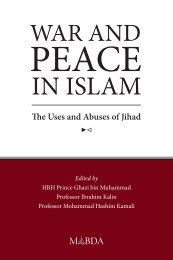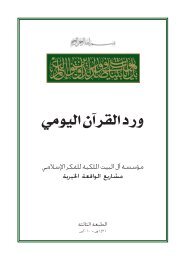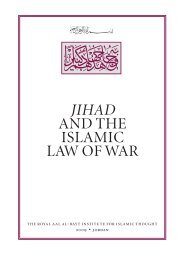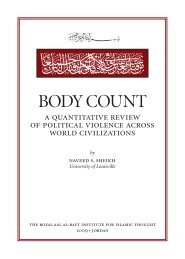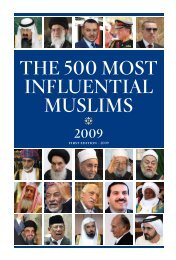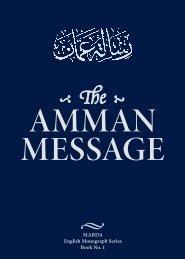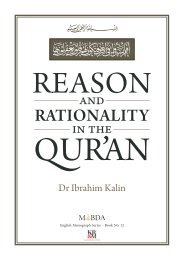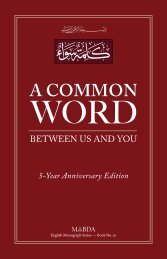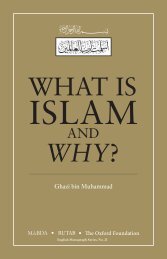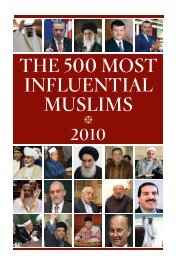Al-W¥^idÏ's Asb¥b al-Nuz‰l - The Royal Islamic Strategic Studies ...
Al-W¥^idÏ's Asb¥b al-Nuz‰l - The Royal Islamic Strategic Studies ...
Al-W¥^idÏ's Asb¥b al-Nuz‰l - The Royal Islamic Strategic Studies ...
You also want an ePaper? Increase the reach of your titles
YUMPU automatically turns print PDFs into web optimized ePapers that Google loves.
Asbab <strong>al</strong>-Nuzul<br />
<strong>al</strong>-Kindi> Muhammad ibn ‘Abd <strong>Al</strong>lah ibn Sulayman <strong>al</strong>-Hadrami> Abu Bakr ibn Abi Shaybah> Abu<br />
Mu‘awiyah> <strong>al</strong>-A‘mash> ‘Abd <strong>Al</strong>lah ibn Murrah> <strong>al</strong>-Bara’ ibn ‘Azib who related that the Prophet, <strong>Al</strong>lah<br />
bless him and give him peace, stoned a Jewish man and a Jewish woman 13 and said afterwards: “(Whoso<br />
judgeth not by that which <strong>Al</strong>lah hath reve<strong>al</strong>ed: such are disbelievers) [5:44], (Whoso judgeth not by that<br />
which <strong>Al</strong>lah hath reve<strong>al</strong>ed: such are wrong-doers) [5:45], (Whoso judgeth not by that which <strong>Al</strong>lah hath<br />
reve<strong>al</strong>ed: such are evil-livers) [5:47]. <strong>Al</strong>l these three verses were reve<strong>al</strong>ed about the disbelievers”. This was<br />
narrated by Muslim from Abu Bakr ibn Abi Shaybah.<br />
(Lo! We did reve<strong>al</strong> the Torah, wherein is guidance and a light…) [5:44].<br />
Abu Muhammad <strong>al</strong>-Hasan ibn Muhammad <strong>al</strong>-Farisi informed us> Muhammad ibn ‘Abd <strong>Al</strong>lah ibn<br />
Hamdun> Ahmad ibn Muhammad ibn <strong>al</strong>-Hasan> Muhammad ibn Yahya> ‘Abd <strong>al</strong>-Razzaq> Ma‘mar><br />
<strong>al</strong>-Zuhri who said: a man from Muzaynah related to me while we were with Sa‘id ibn <strong>al</strong>-Musayyab> Abu<br />
Hurayrah who said: “A Jewish man committed adultery with another woman, so the Jews said to each<br />
other: ‘Let us go to this Prophet, for he has been sent as a Prophet to make things easy. If his edict is<br />
other than stoning, we will accept it and take it as our argument in front of <strong>Al</strong>lah. We would say: ‘This is<br />
the edict of one of your prophets’. ‘And so they went to the Prophet, <strong>Al</strong>lah bless him and give him peace,<br />
and found him sitting in the mosque with his Companions. <strong>The</strong>y said: ‘O Abu’l-Qasim! What is your<br />
judgment concerning a man and a woman who commit adultery’ He did not answer them, and instead<br />
proceeded until he got to the door of their synagogue and said: ‘I plead with you through <strong>Al</strong>lah Who has<br />
sent the Torah to Moses, what does the Torah state concerning the punishment of a married person who<br />
commits adultery’ <strong>The</strong>y said: ‘<strong>The</strong> faces of the adulterers are darkened with co<strong>al</strong>, they are then transported<br />
round on the back of a donkey, with their backs facing to each other, and then they are flogged’.<br />
A young man in their assembly did not say anything. When the Prophet, <strong>Al</strong>lah bless him and give him<br />
peace, saw that he did not speak, he pleaded with him again. <strong>The</strong> young man said: ‘By <strong>Al</strong>lah, now that<br />
you insist in your pleading, I can tell you that the punishment that we find in the Torah is stoning’. <strong>The</strong><br />
Prophet, <strong>Al</strong>lah bless him and give him peace, asked him: ‘When was the first time you suspended the<br />
command of <strong>Al</strong>lah, glorified and majestic is He’ He said: ‘A relative of one of our kings committed adultery,<br />
and stoning was not applied on him. <strong>The</strong>n a well-to-do 14 man committed adultery and when they<br />
wanted to stone him, his clan stood up for him, saying: ‘You are not going to stone our man until you<br />
bring the relative of the king and stone him’. And so they agreed on this punishment among them’. <strong>The</strong><br />
Prophet, <strong>Al</strong>lah bless him and give him peace, said: ‘I judge by that which is in the Torah’, and he ordered<br />
that the man and the woman be stoned”. 15<br />
Said <strong>al</strong>-Zuhr: “We heard that this verse (Lo! We did reve<strong>al</strong> the Torah, wherein is guidance and a light,<br />
by which the prophets who surrendered (unto <strong>Al</strong>lah)…), and the Prophet, <strong>Al</strong>lah bless him and give him<br />
peace, was one of them”.<br />
Ma‘mar said: <strong>al</strong>-Zuhri informed me> S<strong>al</strong>im> Ibn ‘Umar who said: “I was there when the Messenger of<br />
<strong>Al</strong>lah, <strong>Al</strong>lah bless him and give him peace, ordered their stoning. When they were being stoned, I saw<br />
the Jewish man shielding the woman from the stones thrown at them”.<br />
(So judge between them by that which <strong>Al</strong>lah hath reve<strong>al</strong>ed…) [5:49].<br />
Said Ibn ‘Abbas: “A group of Jews which included Ka‘b ibn Asad, ‘Abd <strong>Al</strong>lah ibn Suriya and Shas ibn Qays<br />
said to each other: ‘Let us go to Muhammad lest we seduce him from his religion’. When they went to<br />
him, they said: ‘O Muhammad, you know that we are the rabbis and nobles of the Jews, and if we were to<br />
follow you, the Jews will follow us without objection. We will believe in you and confirm your message<br />
13<br />
Details of this incident can be found in Durr, :75-77.<br />
14<br />
Contrary to the reading of the editor <strong>al</strong>-Sayyid Ahmad Saqr, we have read rajulun min surati <strong>al</strong>-nasi instead of rajulun fi usratin<br />
min <strong>al</strong>-nasi.<br />
15<br />
Tabari, :249.<br />
94



